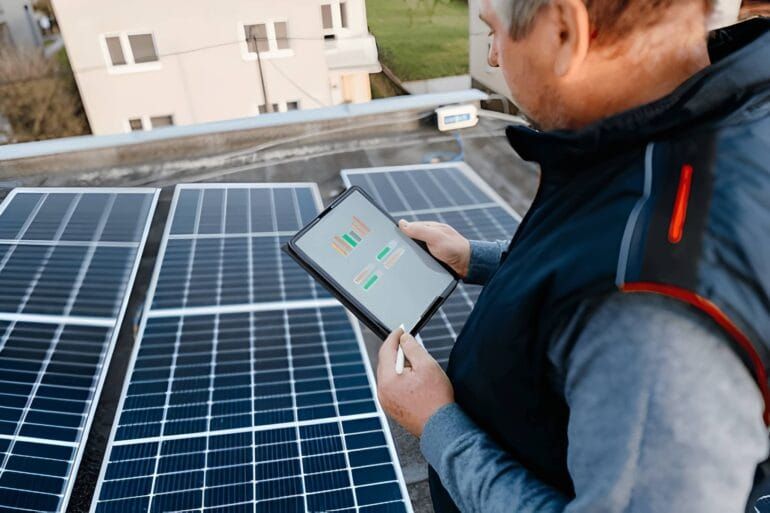Introduction
In an era where sustainability and cost-effectiveness go hand in hand, the spotlight is increasingly turning towards commercial solar solutions as a game-changer in the energy landscape. As businesses strive to reduce their carbon footprint and cut down on operating expenses, the adoption of commercial solar systems has emerged as a compelling strategy. In this blog post, we will delve into the myriad benefits of commercial solar, exploring why it is not just an eco-friendly option but also a smart financial move for businesses of all sizes.
The Rise of Commercial Solar
Commercial solar power is on the rise, and for good reason. The traditional reliance on fossil fuels is not only environmentally detrimental but also financially unsustainable in the long run. Businesses are recognizing the need to transition towards cleaner and more sustainable energy sources, and commercial solar presents a viable and efficient alternative.
Key Benefits of Commercial Solar
Cost Savings: One of the most significant advantages of commercial solar is the potential for substantial cost savings. By harnessing the power of the sun, businesses can significantly reduce their dependence on grid electricity, leading to lower energy bills. While the initial investment in solar panels and installation may seem daunting, the long-term savings far outweigh the upfront costs.
Environmental Impact: Commercial solar systems are a clean and renewable energy source, producing electricity without emitting harmful greenhouse gases. This not only helps businesses fulfill their corporate social responsibility but also positions them as environmentally conscious entities in the eyes of consumers. Going solar is a tangible step towards a sustainable future.
Government Incentives: Many governments around the world are actively promoting the adoption of solar energy through incentives and rebates. Businesses investing in commercial solar may be eligible for tax credits, grants, and other financial incentives, further sweetening the deal and accelerating the return on investment.
Energy Independence: Relying on solar power provides businesses with a degree of energy independence. With solar panels generating electricity on-site, companies are less vulnerable to fluctuations in energy prices and grid outages. This resilience can be a crucial factor in maintaining consistent operations, especially in times of energy scarcity or crisis.
Brand Image and Customer Perception: Consumers are increasingly prioritizing environmentally responsible businesses. Adopting commercial solar not only reduces a company’s carbon footprint but also enhances its brand image. Customers are more likely to support businesses that actively contribute to sustainable practices, giving companies a competitive edge in the market.
Long-Term Investment: While the initial setup cost may seem significant, This system is a long-term investment that pays off over time. Solar panels have a lifespan of 25 years or more, and their maintenance costs are relatively low. This makes commercial solar a financially sound decision with a steady and reliable return on investment.
Aspects of commercial solar

Technological Advancements:
The field of solar technology has seen remarkable advancements in recent years. More efficient solar panels, improved energy storage solutions, and smart grid integration have all contributed to the increased effectiveness of commercial solar systems. Businesses can now harness more energy from the sun and optimize its usage through innovative technologies, further maximizing their savings.
Environmental Stewardship
Beyond the financial benefits, embracing commercial solar reflects a commitment to environmental stewardship. Businesses play a pivotal role in the global effort to combat climate change, and transitioning to clean energy sources is a tangible way for companies to contribute to a sustainable future. Commercial solar not only reduces carbon emissions but also sets a positive example for other businesses and the community.
Job Creation and Economic Impact
The solar industry has become a significant source of job creation. Investing in these projects stimulates economic growth by creating employment opportunities in manufacturing, installation, maintenance, and research and development. Businesses can take pride in contributing to the growth of a sector that not only saves them money but also fosters economic development.
Resilience Against Energy Price Volatility
Traditional energy sources are often subject to price volatility influenced by geopolitical events and market fluctuations. Commercial solar provides a stable and predictable energy source, shielding businesses from the uncertainties of energy price hikes. This resilience is especially crucial for industries with high energy consumption, allowing them to budget effectively and maintain financial stability.
Educational and Employee Engagement Opportunities
Adopting commercial solar can also serve as an educational opportunity for employees. Businesses can promote sustainability initiatives and offer educational programs about the benefits of solar energy. This not only raises awareness but also engages employees in the company’s commitment to environmental responsibility, fostering a sense of pride and purpose among the workforce.
Grid Independence and Backup Power
Commercial solar systems can be designed to operate independently of the traditional power grid, providing a reliable backup during grid failures. This is particularly valuable for businesses that require uninterrupted operations. The ability to generate power on-site enhances a company’s resilience and ensures continuous productivity, even in the face of unforeseen disruptions.
Global Competitiveness
As countries worldwide prioritize clean energy and sustainability, businesses that embrace commercial solar gain a competitive edge on the global stage. Meeting international environmental standards and demonstrating a commitment to green practices can open doors to new markets and partnerships. Commercial solar adoption is not just a cost-saving measure; it’s a strategic move that positions businesses as leaders in a rapidly evolving global landscape.
The Technological Advancements Driving Commercial Solar
The success of commercial solar can be attributed, in part, to the rapid advancements in solar technology. Over the years, the efficiency of solar panels has increased significantly, making them more capable of harnessing solar energy even in less-than-ideal conditions. Innovations such as bifacial solar panels, which capture sunlight from both sides and solar tracking systems, optimizing panel orientation for maximum sunlight exposure, have further boosted the overall efficiency of commercial solar installations.
Additionally, energy storage solutions, such as advanced battery technologies, play a pivotal role in making commercial solar systems more reliable. These batteries store excess energy generated during sunny periods, allowing businesses to draw from this reserve during cloudy days or peak demand times. This technological synergy ensures a consistent and reliable power supply, addressing one of the historical challenges associated with solar energy.
The Economic Case for Commercial Solar
Beyond the immediate cost savings on energy bills, businesses investing in commercial solar are also contributing to the growth of the renewable energy industry. As demand for solar technology rises, economies of scale come into play, leading to further reductions in the cost of solar panels and related equipment. This, in turn, makes it more economically viable for other businesses to embrace solar energy, creating a positive cycle of sustainability and cost-effectiveness.
Moreover, the solar industry is a significant source of job creation. The installation, maintenance, and development of solar projects require a skilled workforce, providing employment opportunities in communities around the world. This economic impact further underscores the multifaceted benefits of commercial solar, extending beyond individual businesses to contribute to broader societal well-being.
Navigating the Implementation Process
While the benefits of commercial solar are clear, the process of transitioning to solar power requires careful planning and execution. Businesses considering this shift should conduct a thorough energy audit to determine their specific energy needs and the feasibility of solar integration. Working with experienced solar providers can streamline the process, ensuring the design and installation of a system tailored to the unique requirements of the business.
Government incentives and financing options can also play a crucial role in making the transition financially viable. Businesses should explore available programs and collaborate with experts to navigate the complex landscape of regulations and incentives, maximizing the return on their investment.
Looking Ahead: The Future of Commercial Solar
The future of commercial solar looks promising, with ongoing research and development focused on enhancing efficiency, reducing costs, and expanding the potential applications of solar technology. From transparent solar panels that can be integrated into windows to innovations in solar storage solutions, the trajectory of commercial solar points towards a more sustainable and technologically advanced energy landscape.
As businesses increasingly recognize the importance of environmental stewardship and cost-effective operations, commercial solar is poised to become a cornerstone of the global energy transition. It is not merely a trend but a strategic imperative for businesses looking to thrive in a world where sustainability and financial prudence are interconnected.
Conclusion
In conclusion, commercial solar is not just a buzzword; it’s a transformative solution for businesses seeking to save on energy costs while making a positive impact on the environment. The financial incentives, coupled with the long-term benefits and positive brand image, make commercial solar a compelling choice for businesses across industries. As we navigate a future where sustainability is paramount, embracing commercial solar is more than a smart business decision—it’s a commitment to a greener and more prosperous tomorrow.







